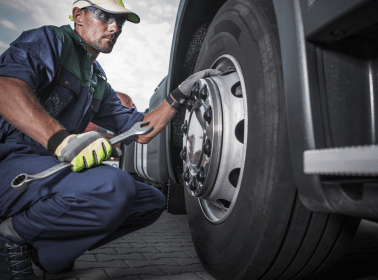
The Importance of Preventative Semi-Truck Maintenance
In the fast lanes of shipping and logistics, planning ahead is a major key to business success- not only for your loads but for your equipment as well. Preventative truck maintenance is the act of pre-planning routine maintenance checks or updates regularly, even if nothing is immediately wrong. While this may take some additional time to plan and undertake, it comes with a wide range of benefits! If you haven’t considered establishing a preventative maintenance schedule previously and are wondering where to start, we’ve got you covered.
What Are the Benefits of Preventative Semi-Truck Maintenance?
Extended Equipment Lifespan: If you were to only check your equipment every year, or ‘as needed’, you may see a decline in the overall lifespan of your equipment in comparison to other models. Preventative maintenance can aid in spotting imperfections earlier on, making it easier to fix issues along the way, rather than waiting for them to snowball into a large-scale problem.
Reduced Downtime: At first glance, one might look at preventative maintenance as too time-consuming. But once you’ve got the schedule created, you may find that it can fit into the moments where downtime was already planned. Taking the time in advance to check over things and spot issues early on can prevent major breakdowns that may put your equipment out of commission for days, or even weeks. Not only does it save time, but it can also help save your bottom line.
Increased Safety: Preventative truck maintenance is not only helpful for keeping your equipment running well, but it’s also important to identify safety hazards in advance. Faulty equipment can take your truck off the road, but it can also lead to accidents and injuries. Taking the time to routinely inspect and test the parts of your equipment is crucial to ensure you are avoiding serious risks to yourself and others.
How Often Should I Get My Semi-Truck Inspected?
The schedule in which you plan your maintenance is going to depend on multiple factors: the type of semi-truck, distance run, overall equipment mileage, and more. After you’ve evaluated the equipment and systems you’re utilizing on a day-to-day basis, you may find that certain parts of your equipment are going to need checks at different times.
Ideally, a driver should be inspecting parts of the equipment daily, as a part of your pre-trip inspection. This will include key areas like brakes, mirrors, tires, etc. For items like oil changes, you may need to schedule them based on the brand of equipment you’re running, as well as the oil type your shop uses. Trailers like flatbeds and regular cargo vans may have a longer time between overall inspections, but trailers with sensitive equipment (like refrigerated units), will need to be checked on far more frequently.
What Should Be Inspected During Preventative Truck Maintenance?
If you look online, there are a plethora of semi-truck maintenance checklists that you can customize to your equipment. The FMCSA provides a very concise list of items that should be reviewed in a pre-trip inspection that can serve as a great jumping-off point.

• Service brakes, including trailer brake connections
• Parking brake
• Steering mechanism
• Lighting devices and reflectors
• Tires, wheels, and rims
• Horns
• Windshield wipers
• Mirrors
• Coupling devices, trailer connections
• Any emergency equipment
Additionally, depending on the time of year, additional checks may need to be performed for equipment that could be impacted by weather and temperature shifts. If you’re unsure, get a second opinion from mechanics who frequently work on semi-trucks and see what they recommend.
The bottom line: investing time in regular upkeep outside of the manufacturer’s recommended schedule, you are ensuring that your trucks perform the best for years to come. At Melton, our drivers are set up for success with modern, late-model equipment that runs efficiently and breaks down less often. Many of our terminals also have fully staffed shops, so our drivers always have access to expert mechanics who know what to look out for. Learn more about the benefits of being a Melton driver on our flatbed driving jobs page.
